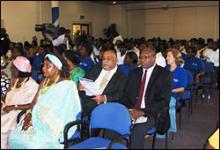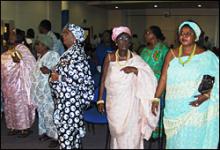Ghana World Health Day 2008 celebration photos
KOFORIDUA -- On 25 July 2008, the forecourt of the Eastern Regional Coordinating Council (RCC) in Koforidua was the scene of a colorful ceremony to present school items to a group of orphans and vulnerable children (OVC) and their parents.
These children are among 300 OVC who are benefiting from the activities of the District Response Initiative (DRI) Care and Support program for those infected and affected by HIV/AIDS. The DRI which was funded by the Royal Netherlands Embassy (RNE) and executed by WHO through the Regional Coordinating Council took advantage of Ghana's existing decentralized system of local government to strengthen the multisectoral approach to HIV/AIDS care and support at the district and community levels.
The initiative was in recognition of the fact that among people affected and infected with HIV, the support of family members living with the disease, as well as the care and education of orphans and vulnerable children (OVC) places a heavy toll on a family income.
According to the National HIV Prevalence and AIDS Estimation Report, about 16 947 children (0 - 14 years old), were living with HIV by the end of 2007, out of which almost 3000 were new infections. In the same year Ghanaian children who had lost both parents over the years to AIDS were estimated to number 45,410.
It was in view of similar data that support for vulnerable children was included as a key activity in the RNE/WHO supported DRI when it was initiated.
Presentation ceremony
This ceremony to present school items, seen as one of the highlights in the DRI implementation activities, was witnessed by the Deputy Regional Minister, Honorable Ofosu Asamoah, District Chief Executives in the Eastern Region, Mr S. A. Bawa and Ms Golda Asante of the RCC, Dr Rosalinda Hernandez and Dr Sally Ann Ohene of WHO Ghana and other distinguished guests.
In his speech, the Deputy Regional Minister, Honorable Ofosu Asamoah, stated that "Government recognizes and appreciates the initiative of the Netherland Embassy through the World Health Organization in supporting 300 needy children from the various district with school fees, school bags, shoes and stationery among others to motivate them to go to school".
On behalf of the WHO Representative in Ghana, Dr Sally-Ann Ohene said WHO was honored to be a partner in the DRI program and hoped that the donation of the school items would encourage the children to go to school.
For more information please contact:
Drs Sally Ann Ohene and Rosalinda Hernandez
HIV/AIDS Unit
WHO Ghana
Ms Sophia Twum-Barima
Health Information and promotion Officer, WHO Country Office
P. O. Box MB 142, Accra, Ghana
Telephone: 00 233 763918/19
Fax: 00 233 21 763920
e-mail: twum-barimas [at] gh.afro.who.int (twum-barimas[at]gh[dot]afro[dot]who[dot]int)




